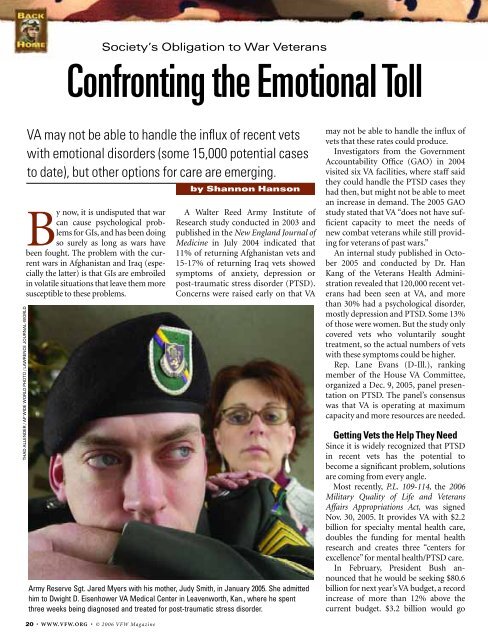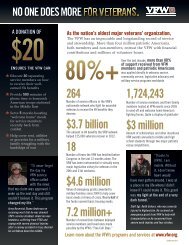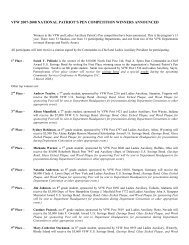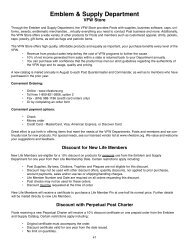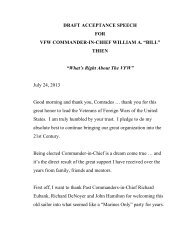2006 VFW Magazine - Veterans of Foreign Wars
2006 VFW Magazine - Veterans of Foreign Wars
2006 VFW Magazine - Veterans of Foreign Wars
Create successful ePaper yourself
Turn your PDF publications into a flip-book with our unique Google optimized e-Paper software.
Society’s Obligation to War <strong>Veterans</strong><br />
Confronting the Emotional Toll<br />
THAD ALLENDER / AP WIDE WORLD PHOTO / LAWRENCE JOURNAL-WORLD<br />
VA may not be able to handle the influx <strong>of</strong> recent vets<br />
with emotional disorders (some 15,000 potential cases<br />
to date), but other options for care are emerging.<br />
By now, it is undisputed that war<br />
can cause psychological problems<br />
for GIs, and has been doing<br />
so surely as long as wars have<br />
been fought. The problem with the current<br />
wars in Afghanistan and Iraq (especially<br />
the latter) is that GIs are embroiled<br />
in volatile situations that leave them more<br />
susceptible to these problems.<br />
by Shannon Hanson<br />
A Walter Reed Army Institute <strong>of</strong><br />
Research study conducted in 2003 and<br />
published in the New England Journal <strong>of</strong><br />
Medicine in July 2004 indicated that<br />
11% <strong>of</strong> returning Afghanistan vets and<br />
15-17% <strong>of</strong> returning Iraq vets showed<br />
symptoms <strong>of</strong> anxiety, depression or<br />
post-traumatic stress disorder (PTSD).<br />
Concerns were raised early on that VA<br />
Army Reserve Sgt. Jared Myers with his mother, Judy Smith, in January 2005. She admitted<br />
him to Dwight D. Eisenhower VA Medical Center in Leavenworth, Kan., where he spent<br />
three weeks being diagnosed and treated for post-traumatic stress disorder.<br />
may not be able to handle the influx <strong>of</strong><br />
vets that these rates could produce.<br />
Investigators from the Government<br />
Accountability Office (GAO) in 2004<br />
visited six VA facilities, where staff said<br />
they could handle the PTSD cases they<br />
had then, but might not be able to meet<br />
an increase in demand. The 2005 GAO<br />
study stated that VA “does not have sufficient<br />
capacity to meet the needs <strong>of</strong><br />
new combat veterans while still providing<br />
for veterans <strong>of</strong> past wars.”<br />
An internal study published in October<br />
2005 and conducted by Dr. Han<br />
Kang <strong>of</strong> the <strong>Veterans</strong> Health Administration<br />
revealed that 120,000 recent veterans<br />
had been seen at VA, and more<br />
than 30% had a psychological disorder,<br />
mostly depression and PTSD. Some 13%<br />
<strong>of</strong> those were women. But the study only<br />
covered vets who voluntarily sought<br />
treatment, so the actual numbers <strong>of</strong> vets<br />
with these symptoms could be higher.<br />
Rep. Lane Evans (D-Ill.), ranking<br />
member <strong>of</strong> the House VA Committee,<br />
organized a Dec. 9, 2005, panel presentation<br />
on PTSD. The panel’s consensus<br />
was that VA is operating at maximum<br />
capacity and more resources are needed.<br />
Getting Vets the Help They Need<br />
Since it is widely recognized that PTSD<br />
in recent vets has the potential to<br />
become a significant problem, solutions<br />
are coming from every angle.<br />
Most recently, P.L. 109-114, the <strong>2006</strong><br />
Military Quality <strong>of</strong> Life and <strong>Veterans</strong><br />
Affairs Appropriations Act, was signed<br />
Nov. 30, 2005. It provides VA with $2.2<br />
billion for specialty mental health care,<br />
doubles the funding for mental health<br />
research and creates three “centers for<br />
excellence” for mental health/PTSD care.<br />
In February, President Bush announced<br />
that he would be seeking $80.6<br />
billion for next year’s VA budget, a record<br />
increase <strong>of</strong> more than 12% above the<br />
current budget. $3.2 billion would go<br />
20 • WWW.<strong>VFW</strong>.ORG • © <strong>2006</strong> <strong>VFW</strong> <strong>Magazine</strong>


